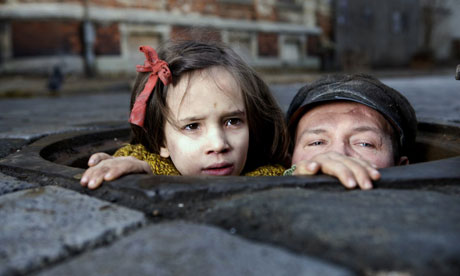
Agnieszka Holland is the dark horse of the 2012 Oscars, which seems oddly fitting. Her latest film, In Darkness, plays as a begrimed Schindler tale, with its protagonist, Leopold Socha, hiding out in the sewers of Lviv while the Holocaust rages overhead. It has brought the 63-year-old director a nomination in the foreign language category, where she is pitted against the highly fancied A Separation, and marks the latest twist in a career that has taken her from Warsaw to Prague, Paris and LA.
"Where is home?" mutters Holland, sipping bottled water in a London club. "Maybe this is." Dressed for purpose with her utilitarian hairdo and resilient, thick-framed glasses, she briskly explains that she made two Holocaust dramas before In Darkness (Angry Harvest; Europa, Europa) and was reluctant to tackle another. However, the thorny, nuanced script won her over; so much more than a glib morality tale about victims and villains, angels and demons. She liked shooting in the sewers too. "The setting gave me the chance to tell this very symbolic, deeply disturbing story without having to go into the big theatre of war."
In Darkness spins the fact-based tale of Socha (Robert Wieckiewicz), an antisemitic ne'er-do-well who throws a lifeline to Jewish refugees. It could be claimed that the film's cultural and racial tensions reflect the pedigree of Holland herself, who had a Catholic mother and a Jewish father and was raised in secular, communist Poland where religion had gone to ground. "But I had a nanny, a peasant woman who raised me because my parents were working," she recalls. "Very Catholic, very devout. I remember one day her taking me aside and telling me that Jesus was probably a Jew, but that I should never say this because it was a secret."
In Darkness asks implicit questions of its viewers. How would they behave if the stakes were so high? What choices would they make in the same situation? Holland admits that she is always asking the same questions of herself.
In 1970, for instance, she was arrested and imprisoned for six weeks. "I was studying film in Prague and was arrested for political activity. For protesting. They put me in a cell, underground, at the college." They had cells at the college? "Yes, yes. Very harsh. But after the first moments of fear, it was fascinating to see how much I could stand. If I could behave well, if I would crack and name names. After two weeks they gave me another young girl as a cellmate, a young thief. She had been raped by the guards and I had to look after her." She gives a matter-of-fact nod, then returns to her water.
Back in Poland, Holland worked with Andrzej Wajda, befriended Krzysztof Kieslowski and shot three films of her own before fleeing to France when martial law was declared. In Europe she made Europa, Europa, The Secret Garden and Total Eclipse, before moving to the US to shoot Washington Square.
Holland runs me through these changing terrains. "In Poland we didn't have the money and we didn't have the film, which meant that you had to cut the movie in your head before shooting it. We had censorship but the paradox was that we felt free, at least while we were shooting. In France, I had to re-establish and assert myself; the crews mistrusted me. But the shoots were lovely and you have the great lunch in the middle." She gulps down some water. "What shocked me about America was how hierarchical the crews were. People are afraid to express their opinion. They don't want to risk losing their credit or losing their job because they have the big mortgage and the kids in private school. So it is sad and conformist and I think shows the roots of the economic crisis we are in today. Nobody questioning anything."
These days, Holland divides her time between LA and Brittany, splitting her career across two continents. In recent years she has developed a rich sideline in American TV, directing episodes of The Wire, The Killing and Treme. I like the thought of her at work on these shows: the bustling, redoubtable daughter of Europe, gone native amid the Baltimore projects or the suburbs of post-Katrina New Orleans.
"Yes, it's good for me. I'm a bit like the actor who plays Hamlet one week and the bum on the street the next. Variety is its own reward," she says. "Different lives give inner richness."
In Darkness premieres at the Kinoteka Polish film festival on 11 March and opens in the UK on 16 March.

